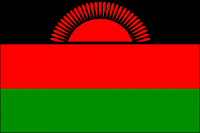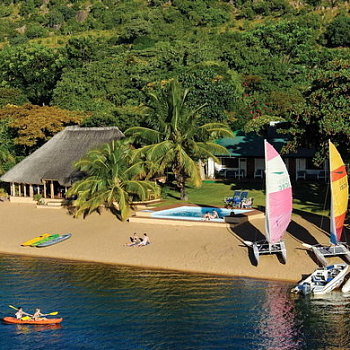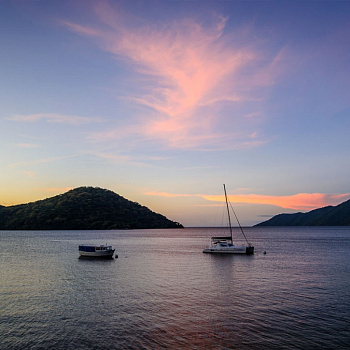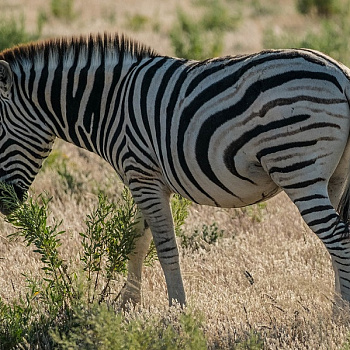Malawi
About country
Malawi is a state located in the southeastern part of the African continent. It borders Zambia in the west, Tanzania in the north and northeast, and Mozambique in the south, southwest and southeast. Part of the border with Tanzania and Mozambique passes through Lake Malawi.
Almost a third of the territory is occupied by Lake Malawi and three smaller lakes. From the north to south in Malawi, there is a part of the East African Rift, where the third largest lake in Africa lies - Malawi (formerly called Nyasa, means in the local language "Lake of Stars"). The main river of the country Shire originates in the southern part of the lake. To the west and east of the East African Rift lie mountain plateaus from 900 to 1200 m in height. In the south of the country are the Shire Mountains, where the highest Malawi Point, Mount Mulanie (3002 m), is located.
Lake Malawi is the center of the country. As an inland sea, it has endless palm-fringed beaches protected by mountains, and this calm and clean water makes it undoubtedly the tourist center of Malawi and a favorite place for swimming and diving.
Malawi is a paradise for naturalists, and boasts a rich variety of large mammals, like most neighboring African countries, including the so-called “Big Five” - the buffalo, elephant, lion, leopard and rhino.
Area: 118.484 square km
Capital: Lilongwe
The largest cities: Blantyre, Lilongwe
Languages: English is the official language of the country. Many local African languages are also used. Most common: Chewa (or Chichewa - the language of the people of Chewa)
Population: 19,2 million
Currency: Local currency is Kwacha (abbreviated as MWK worldwide and K in Malawi). Banknotes of 20, 50, 100, 500, 1000, 5000 and 10000. Kwacha is divided into 100 tambala. But since kwacha is a weak currency, tambala is not used.
The main Domestic product: Corn and flour from it, nuts, beans, peas, tobacco, tea, sugarcane and cotton. Minerals - coal and limestone. Industrial goods: Chemicals, textiles, beverages and food.
Exports: 90% of exports are tobacco in different forms
Climate: Dry winter season from April to November. Little rain during this period and daytime temperatures around 20 degrees. In this time it is good to come on a safari, as the grass is low and the days are not hot. In the hottest months from November to March, the maximum temperatures 30-35 ° C. The coldest month is July. Rain falls mainly in the summer from December to March.
Time Zone: The time zone is GMT + 2 hours
Visas: A visa is required to enter Malawi. Entry visa can be obtained at the consulates of Malawi. The cost of a one-time visa is $ 50 and $ 80 for double entry and $ 160 for multiple entry. Visa can be also obtained for citizens of some countrues at the port of entry to Malawi. (Please consult authorities)
Credit Cards: VISA, MASTER CARD are accepted for payment only in large hotels and shops. ATMs are only in the major cities of Malawi.
Currency exchange: In the country free circulation of foreign currency. In hotels and shops are accepted dollars, euros, pounds sterling, South African rand. Currency can be exchanged in banks. Banking hours: 8: 15-14: 30 (weekdays), 8: 15-10: 30 (on Saturdays). Please do not change money in the markets.
Tips: In Malawi, it is customary to pay tips. In the restaurant: 5-10% of the total bill (including drinks). Porter services: about $ 1 per piece of luggage. Driver guide: $ 2-3 per person per day for work.
Drinking water: Tap water in the main cities and reserves is clean and safe to drink. In small towns we recommend using bottled water only.
Vaccinations: This is the malarial zone and therefore measures must be taken to protect against mosquito bites and to take preventive measures against malaria. Malaria mosquito bites are more likely in the summer wet months from January to March.
Car rental: In Malawi left-hand traffic. Speed limit: within the city is 60 km per hour, on the highway is 100 km per hour. You must have an international driver's license and a credit card to rent a car. Car rental locations only in major cities and airports. Use the services of international car rental companies - they have a wider network of maintenance and support.



